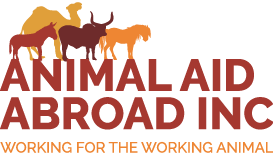Update from Tanzanian partner group TAHUCHA
AAA Partner group, Tanzania Humane Charity (TAHUCHA) extends its sincere thanks and appreciation to Animal Aid Abroad (AAA) supporters for enabling it to work towards the main goal of improving working donkey’s welfare conditions in the Geita region of north west Tanzania.
There is little awareness on the humane handling of working donkeys, and they seem to be the most abused animals. Poverty is a major problem in Geita, contributing to overworking, beating and all forms of mistreatment like surviving on low rations due to time and money pressure.
These donkeys primarily are used for transporting loads comprising of bricks, sand, logs, and are heavily relied upon as a direct source of income generation for households and the nation at large.
The extra issue is that oxen were originally the working animals of choice in this region. In more recent times, donkeys have replaced oxen, with the community still using the original heavy, ox-yoke carts; this is in contrast to some other countries like Ethiopia and Zanzibar -Tanzania Island where more appropriate methods are used.
To answer the specific issue of ox yoke harnesses, we have 22 humane carts in use and our plan was manufacture more humane carts in 2020 but the pandemic Covid19 saw us fast track.
Donkeys are the working animals of choice in the Bukombe District, and with a yoke harness system all the weight goes on the small necks of donkeys while serving in a wide range of environments that includes kilns, households, markets small scale mines and forests. In all places, they do the work of tractors and vehicles, are badly beaten and end up with pain, exhaustion and wounds.
Since 2016, we are concerned with the welfare and inefficiency of its labor and with the support of Animal Aid Abroad Australia we are providing education and treatment services to reveal the pain and suffering of working donkeys.
In November 2020 we have been able to serve donkeys in the rural settings of 8 villages across 5 wards of the Bukombe District through mobile and outreaches. Issues in focus are donkey wounds and pain as a result of ox yoke harness, overworking, overloading and beating and signs of illness.
In November 2020, we have managed to reach 415 donkeys with wound problems, their wounds dressed and successfully healed and various conditions of tetanus, hematoma, fungal infections, diseases and lameness due to tendon exhaustion or hoof issues but all were treated successfully. That included the offer to give donkeys a rest at our sanctuary, especially with tendon exhaustion cases.
A sum of 34 donkeys in our care at TAHUCHA sanctuary were kept as refugees and given a rest with no treatment and 13 were treated and recovered in one month and released back to work with conditions and agreements of not injuring animals.
On the site of the clinics - once animals were treated, donkey owners were educated on the humane handling of donkeys. In November 2020 specifically 34 community members around the kilns were educated on humane treatment and 21 around the small scale Gold mine where poor people with their donkeys were educated too.
We are proud of leaving a legacy of 16 champions working on a volunteering basis, some independent and some becoming independent on educating others in areas of correctly fitting harnesses, identifying and cleaning minor wounds and wounds that need vet attention, identifying symptoms of illness in the communities considering gender among them.
We learnt that, if a program on the ground is locally led and locally driven -like what we do here to help animals, it becomes owned by the community members and sustainable.
Thanks Animal Aid Abroad for invaluable input since 2016.


